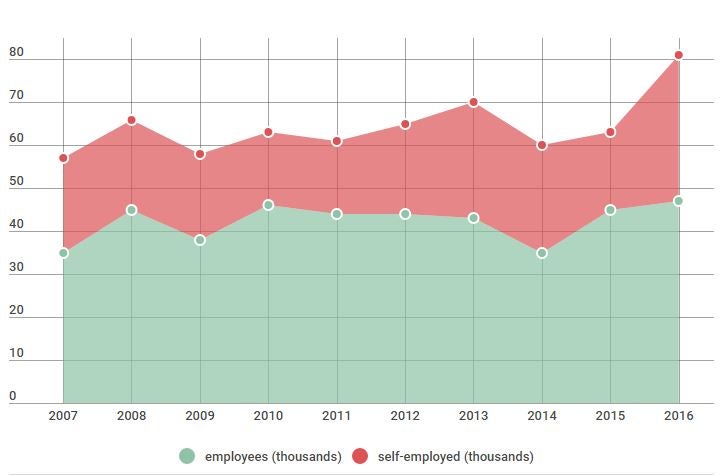
Freelance journalists typically earn around £20,000 a year from journalism, according to a survey by the NCTJ.
And around one third are believed to be in receipt of state benefits.
The survey follows data from the Labour Force Survey which shows a surge in the number of freelance journalists in the UK to 34,000 in 2016 from 18,000 a year earlier.
The government statistics found that 84,000 people in total categorised themselves as journalists, compared to 64,000 in 2015.
The National Council for the Training of Journalists questioned some 621 freelance journalists of whom 526 answered questions about their earnings.
The median, or typical, earnings figure was £19,499 whilst the average was £22,984. Two respondents said they earned more than £100,000 a year from journalism, whilst 73 said they earned less than 5,000.
Around a third of those questioned said they also did other work outside journalism.
Using data from the Annual Survey of Hours and Earnings the NCTJ reports that in 2015 the overall typical, or median, pay for full-time journalists in the UK in 2015 was £30,884 a year. This compares to the overall median UK salary of £27,645.
The survey reported that many respondents saw a trend for freelance journalism earnings to have decreased in recent years.
One said: “The basic problem with freelance journalism now is that the rates for the job have collapsed as has the amount of commissioned work publications will entertain.
“So in a nutshell very little work and if there is its now at very low rates.”
Another said: “The growing trend for outlets (especially online) to offer no payment for work citing ‘exposure’.
“Pay has already fallen dramatically in the past 10 years.
“According to the Labour Force Survey some 36 per cent of self-employed journalists are claiming state benefits or tax credits versus 17 per cent of employed journalists.
Many freelances also cited the problem of late payment for work.
One said: “The real downside to freelance work is not being paid on time (or being paid less than agreed) and the humiliation of having to chase for what you are due.
Another said: “Major issues facing freelancers are late payments. This can be brutal as a self-employed journalist and difficult to handle without
straining the relationship with clients.”
NCTJ chief executive Joanne Butcher said: “This wide-ranging research report provides detailed and valuable information about the growing freelance journalism market.
“Now that journalism has one of the highest rates of self-employment in the UK economy, the NCTJ must focus more of its work on providing accessible training and qualifications to meet the needs of modern freelance journalists.”
Read the NCTJ freelance journalism survey in full.
Email pged@pressgazette.co.uk to point out mistakes, provide story tips or send in a letter for publication on our "Letters Page" blog
